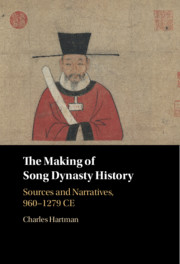Book contents
- The Making of Song Dynasty History
- The Making of Song Dynasty History
- Copyright page
- Dedication
- Contents
- Figures
- Tables
- Preface
- A Note on the Text
- Introduction
- Part I Sources
- 1 The Song State Compendium
- 2 Li Tao and the Long Draft
- 3 Li Xinchuan and the Chronological Record
- 4 The Daoxue Historians
- 5 The Song History
- Part II Narratives
- Bibliography
- Index
5 - The Song History
from Part I - Sources
Published online by Cambridge University Press: 24 September 2020
- The Making of Song Dynasty History
- The Making of Song Dynasty History
- Copyright page
- Dedication
- Contents
- Figures
- Tables
- Preface
- A Note on the Text
- Introduction
- Part I Sources
- 1 The Song State Compendium
- 2 Li Tao and the Long Draft
- 3 Li Xinchuan and the Chronological Record
- 4 The Daoxue Historians
- 5 The Song History
- Part II Narratives
- Bibliography
- Index
Summary
As one of the so-called “twenty-four dynastic histories,” the Song History (Songshi), compiled by a committee of Yuan dynasty court historians and completed in 1345, was for many centuries, and in many senses remains, the official history of the dynasty. Ming and Qing historians criticized the Song History for its inordinate length and haphazard editing, labeling it the worst of the dynastic histories. This chapter maintains, however, that the work’s elaborate system of editorial comments creates a superstructure of meaning that seeks to transcend the often-conflicting details of the work’s text. The purpose of this superstructure was to utilize Song history to advance the political fortunes of Toghto, the work’s leading court sponsor and the Song History’s official “author.” Toghto led an intellectual and political faction, composed of Chinese and Mongol Confucians, that supported a vision of Song Confucian institutionalism and opposed the patrimonialism of the nativist Mongol party at the Yuan court. Toghto’s editorial committee, Chinese and Mongol adherents of Zhu Xi’s daoxue teachings, utilized thirteenth-century daoxue narratives to advance the superiority of their political vision for the Yuan state. This chapter also examines the intellectual and political background of Ouyang Xuan (1283–1357), the work’s de facto editor in chief who imposed this vision over the documentary legacy of official Song historiography.
Keywords
- Type
- Chapter
- Information
- The Making of Song Dynasty HistorySources and Narratives, 960–1279 CE, pp. 172 - 220Publisher: Cambridge University PressPrint publication year: 2020

